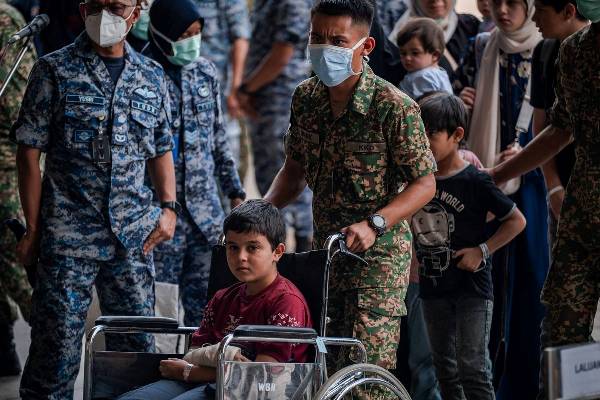A Hamas rally in Ramallah in 2007. (Hoheit/Creative Commons Attribution-Share Alike 2.0 Germany)
By As’ad AbuKhalil
Special to Consortium News

Hamas has been an important factor in Arab politics since its founding in 1987. It stirred controversy from the very beginning: many objected to its references to the repugnant Protocols of the Elders of Zion (the notorious antisemtic forgery) in the founding document, and it exhibited anti-Jewish sentiments — and even anti-Christian sentiments at first.
But Palestinian society has been known — in contrast to Lebanon — for its aversion to sectarianism, despite the propagation of sectarian Salafite ideology from the Gulf.
Hamas was compelled to change its rhetoric and its last political document (just like Hizbullah) made it clear that it opposes Zionism and not Judaism. (Some of Hamas leaders and supporters still speak in anti-Jewish terms). Hamas felt the pressure from Palestinian society it went out of its way to show that Palestinian Christians would be perceived as part of the larger Palestinian society.
The rise of Hamas was not steady; the movement underwent various shifts and transformations; its foreign relations also changed, sometimes becoming closer to Iran than Qatar, and other times the reverse.
In the second Intifada, it was behind many of the bombings which were not directed at military targets. To say that this soured Western public opinion would be irrelevant because Western governments, media, and some in society, were hostile (even racistly hostile) toward Palestinians and Arabs in general, regardless what actions Palestinians take against the savage Israeli occupation.
There was also a debate that ensued, in Arabic, away from curious Western eyes. People (Palestinians and Arabs) discussed the usefulness and morality of aimless violence away from strict military targets (this was triggered by the bombing of a pizza parlor by Hamas in 2001).
There was no consensus among Arabs regarding whether Israeli adults should be treated as legitimate military targets because of service in the military reserve. People openly discussed such matters in the press. Others disagreed and called for a shift in forms of armed struggle by Palestinians in order not to violate the traditional Islamic/Arab norms of war.
Saudi Arabia’s regime was already engaged in propaganda aimed at impressing AIPAC; articles were published in the Saudi press to characterize Hamas’ violence, and the violence of other Palestinian groups, as outright terrorism. This, of course, offends many Arabs who view Israel as the pioneer and specialist in the practice of terrorism in the region, throughout the 20th and 21st centuries.
Hamas’ Election victory

Israeli Prime Minister Yitzhak Rabin meeting in Casablanca in 1994 with PLO chairman Yasser Arafat. (flickr/Israel Government Press Office)
Hamas was considered by Fatah as a threat to its political dominance. (Fatah became, after Oslo, an arm of the occupation although Arafat tried in his last day to play both sides, and to revitalize the armed wing of Fatah after he became increasingly disillusioned with the “peace process.”)
Quickly it became clear that Hamas was becoming the second most influential political organization after Fatah (only during Arafat’s time), as Palestinian leftist groups saw their demise. Fatah was certain it would win the 2006 election and the Israelis agreed, but Fatah got weaker after Arafat was slowly returning to the path of armed struggle — and was killed by Israel with U.S. support because of it.
Elections were permitted 2006 and Hamas won. Hamas won purely as a vote against the corrupt, washed-up Fatah. The Palestinian people came to perceive Fatah, rightly, as a sell-out and as a ruthless tool of the occupation.
The Palestinian political spectrum was divided between the path of Fatah and the path of Hamas. Fatah represented coordination with Israeli occupation, abandonment of armed struggle, trust in the U.S., and hope that Israel would mercifully allow the Palestinians to have a state.
Hamas on the other hand, stood for opposition to peace with Israel, a firm belief in the efficacy of armed struggle, and the determination that only an Islamist ideology could mobilize the people effectively.
A Score to Settle
Hamas believed a return to Islamic teaching was necessary in order to win against Israel. The PLO experience (especially after the flight from Beirut in 1982) represented failure and defeat. Hamas was then what Fatah was in the wake of 1967, when it posed as the revolutionary alternative to failed Arab regimes.
The U.S. and Israel could not accept Hamas’ victory and journalist David Rose revealed in this article in 2008 that both the U.S. and Israel were working for a coup to unseat Hamas in Gaza. So much for Bush’s rhetoric and democracy and the ballot box.
Hamas — unlike Fatah, which suffered since its inception from infiltration and security breaches — formed an effective intelligence apparatus, and pre-empted the coup by its enemies, including Fatah.
Hamas also had a score to settle with Fatah, having suffered from torture in Palestinian Authority dungeons after Oslo. Western governments had no qualms about torture by Israel and the PA as long as the victims were were Islamists and believed in armed struggle.
Right before Oct. 7, Hamas had an identity crisis. It became — like the PA in a sense —associated with a repressive government in Gaza. Things were not as bad as they were under the thugs of the PA in Ramallah, but Hamas was increasingly resorting to repression against expression of opposition and resentment.
Economic hardships weren’t due to Hamas’ rule (after a nearly two-decade Israeli blockade) but the people had only one address to protest against. There was none of the rampant corruption of Fatah, but the Palestinian people in Gaza were getting fed up with the handling of the siege by Hamas.
The people of Gaza were fed up with its impact on their lives. Gaza is not a virtual prison. It is actually an open air prison, with the air, sea and entry points are all controlled by the Israeli occupation. Israel and subservient media still claims that Israel “withdrew” from Gaza in 2005. In fact, the occupation of Gaza never ended.
What Israel did was merely redeploy the occupation troops to outside Gaza, while imposing a tight siege on the strip. The Egyptian government of Sisi is a full partner in the siege (in the time of Husni Mubarak, the Egyptian government allowed for smuggling in order to alleviate the economic conditions in Gaza).
The U.S., typically, deferred to Israel to do what it wishes with the strip, and whenever Israel would decide to launch a savage military campaign against the people in Gaza, the U.S. (right, left and center) went along and provided Israel full support.
Hamas Can’t Be Defeated By Force

The IDF searches for Hamas tunnels in and around Gaza. (IDF/Creative Commons CC BY-NC 4.0)
In 2018, the people of Gaza tried to launch a peaceful protest against the siege. Israel’s response was swift: it shot at the protesters without regard to civilian lives. U.S. indulgence permitted Israel to treat the poor Gazans with callousness and vindictiveness.
Not much is known about the planning of Operation Aqsa Deluge on Oct. 7. Hizbullah and Iran both confirmed that they had no prior knowledge of the operation. There are those who believe Hamas did not act alone; that when the borders opened Islamic Jihad and even smaller groups broke out of the Gaza prison and helped themselves to Israeli hostages. Hamas later admitted that not all the hostages were in its custody.
The U.S. and Israel quickly responded by equating Hamas with ISIS, and President Joe Biden insisted Hamas does not represent the Palestinian people. WINIP (the thinly disguised research arm of the Israeli lobby) came up with a poll to prove that Hamas is not popular and Western media all but declared the end of Hamas.
But Hamas can’t be ended by force. There are reports that its popularity is rising in the West Bank, where it had been banned by the PA. Chants for Hamas have been heard all this week in the West Bank, and in Arab countries.
Things don’t always go according to plan when colonial powers strategize with heavy firepower.
The image of Abu ‘Ubyadah (the military spokesperson of Hamas) has been plastered all over Arab social media and even in streets of Lebanon, the only Arab countries with (almost) unlimited freedom.
The release of the Palestinian prisoners was accompanied with the expression of support for Hamas. And even with the massive level of destruction and death in Gaza, there were grumblings against Hamas by the Palestinian people. For Israel to end Hamas, it must kill or expel all Palestinians from the West Bank, Gaza and all the refugee camps in Jordan, Lebanon and Syria.
The Biden administration wouldn’t apparently object to such a murderous plan.
As’ad AbuKhalil is a Lebanese-American professor of political science at California State University, Stanislaus. He is the author of the Historical Dictionary of Lebanon (1998), Bin Laden, Islam and America’s New War on Terrorism (2002), The Battle for Saudi Arabia (2004) and ran the popular The Angry Arab blog. He tweets as @asadabukhalil
The views expressed are solely those of the author and may or may not reflect those of Consortium News.
Post Disclaimer | Support Us
Support Us
The sailanmuslim.com web site entirely supported by individual donors and well wishers. If you regularly visit this site and wish to show your appreciation, or if you wish to see further development of sailanmuslim.com, please donate us
IMPORTANT : All content hosted on sailanmuslim.com is solely for non-commercial purposes and with the permission of original copyright holders. Any other use of the hosted content, such as for financial gain, requires express approval from the copyright owners.
 Sri lanka Muslims Web Portal Sri Lanka Muslims News Center
Sri lanka Muslims Web Portal Sri Lanka Muslims News Center
 Donate
Donate


